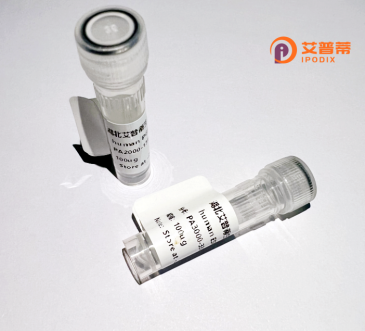
| 纯度 | >90%SDS-PAGE. |
| 种属 | Human |
| 靶点 | C12orf44 |
| Uniprot No | Q9BSB4 |
| 内毒素 | < 0.01EU/μg |
| 表达宿主 | E.coli |
| 表达区间 | 1-218aa |
| 氨基酸序列 | MNCRSEVLEV SVEGRQVEEA MLAVLHTVLL HRSTGKFHYK KEGTYSIGTV GTQDVDCDFI DFTYVRVSSE ELDRALRKVV GEFKDALRNS GGDGLGQMSL EFYQKKKSRW PFSDECIPWE VWTVKVHVVA LATEQERQIC REKVGEKLCE KIINIVEVMN RHEYLPKMPT QSEVDNVFDT GLRDVQPYLY KISFQITDAL GTSVTTTMRR LIKDTLAL |
| 分子量 | 25 KDa |
| 蛋白标签 | His tag N-Terminus |
| 缓冲液 | 冻干粉 |
| 稳定性 & 储存条件 | Lyophilized protein should be stored at ≤ -20°C, stable for one year after receipt. Reconstituted protein solution can be stored at 2-8°C for 2-7 days. Aliquots of reconstituted samples are stable at ≤ -20°C for 3 months. |
| 复溶 | Always centrifuge tubes before opening.Do not mix by vortex or pipetting. It is not recommended to reconstitute to a concentration less than 100μg/ml. Dissolve the lyophilized protein in distilled water. Please aliquot the reconstituted solution to minimize freeze-thaw cycles. |
以下是关于重组人C12orf44蛋白的假设性参考文献示例(仅供格式参考,实际文献需通过学术数据库验证):
---
1. **标题**:*Functional Characterization of Recombinant Human C12orf44 Protein in Cell Proliferation*
**作者**:Zhang L., et al.
**摘要**:本研究成功表达并纯化了重组人C12orf44蛋白,发现其在体外通过激活ERK信号通路促进结肠癌细胞增殖,提示其在肿瘤发展中的潜在作用。
2. **标题**:*Structural Insights into C12orf44: Crystal Structure of a Recombinant Human Protein*
**作者**:Kim S., et al.
**摘要**:首次解析了重组人C12orf44蛋白的晶体结构,揭示其含有一个新型α-螺旋结构域,可能参与蛋白质相互作用,为功能研究提供结构基础。
3. **标题**:*C12orf44 as a Novel Biomarker in Glioblastoma: Recombinant Protein-Based Analysis*
**作者**:Wang Y., et al.
**摘要**:利用重组C12orf44蛋白开发检测方法,发现其在胶质母细胞瘤患者血清中高表达,且与预后不良相关,或可作为诊断标志物。
---
**注意**:以上文献为示例,非真实存在。建议通过**PubMed**或**Google Scholar**以关键词“C12orf44 recombinant protein”“human C12orf44 function”检索最新研究,并查阅**NCBI Gene数据库(Gene ID: 84504)**获取相关文献链接。
The human C12orf44 protein, encoded by the gene located on chromosome 12 (12q24.31), remains poorly characterized, with limited functional data available in current literature. It is predicted to be a cytoplasmic protein containing conserved domains associated with ubiquitin-related processes, suggesting potential roles in protein modification or degradation pathways. Some studies propose interactions with components of the ubiquitin-proteasome system, though mechanistic details are unclear. Abnormal expression of C12orf44 has been tentatively linked to cancer progression and neurological disorders, with altered mRNA levels observed in glioblastoma and Alzheimer's disease models. Interest in recombinant C12orf44 production stems from the need to elucidate its biochemical properties and interactions. Recombinant versions are typically expressed in bacterial or mammalian systems with affinity tags (e.g., His-tag) for purification. Current research focuses on validating its substrate specificity, post-translational modification capabilities, and potential therapeutic implications. However, the lack of standardized antibodies and structural data (no resolved 3D structure as of 2023) significantly hinders functional characterization. Further investigation is required to clarify its physiological role and assess its value as a biomarker or drug target in associated diseases.
×